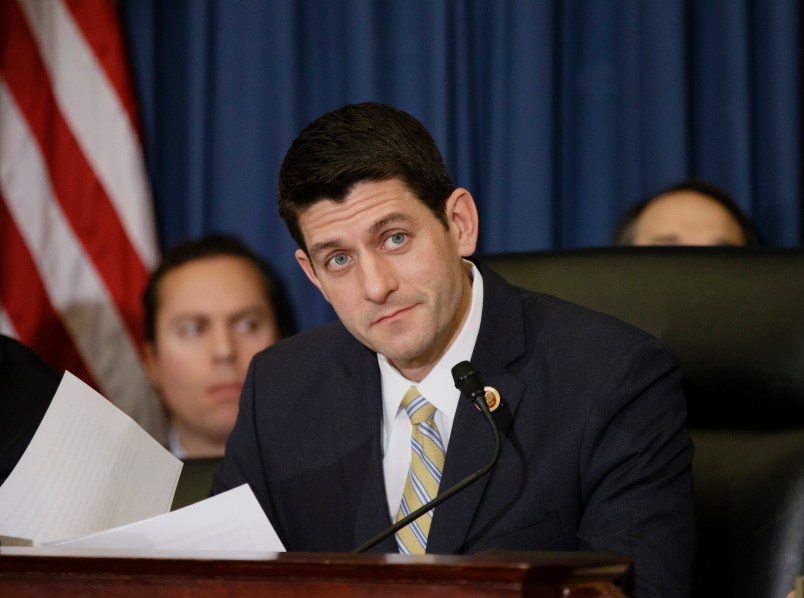Rep. Paul Ryan (R-WI) muscled his signature budget blueprint through the House of Representatives for three straight years, basking in praise from the right and weathering criticism from the left for attempting to privatize Medicare and slash social programs.
This year, the budget chief faces a swath of competing pressures that give him little room to maneuver, and unprecedented divisions within his Republican conference that may leave him with no viable option but to ditch the project.
Ryan hasn’t yet announced whether he will or won’t offer an updated proposal this year. Perhaps tellingly, he refrained from criticizing Senate Democrats after they announced last Friday they won’t be writing a budget. His office declined to comment on Monday. For a theoretical exercise that has no real chance of becoming law, attempting to pass a budget resolution this year is a high-risk, low-reward proposition for Ryan.
Here are five reasons why the House Budget chairman is in a jam.
1. House Republicans are divided on how much to spend, the first order of business in a budget resolution. Right-wing members want to spend less than appropriators and military hawks are willing to. The two year budget deal that Ryan struck in December with Sen. Patty Murray (D-WA), which passed Congress and was signed into law, raised spending from low levels ordered by across-the-board sequester cuts to $1.012 trillion in 2014 and $1.014 in 2015. That’s because Ryan and other Republicans concluded that sequestration was unsustainable. But 62 House Republicans voted against that bill, and Ryan only has about 15 GOP votes to spare (given that he’s unlikely, again, to win any Democratic support). That puts Ryan in a predicament: renege on his own budget deal or somehow corral the votes of conservatives who lack an incentive to vote for higher spending levels.
2. The GOP is all over the map on entitlements, attacking President Barack Obama for cutting Medicare one minute, then bashing Obama for refusing to “get serious” about entitlement cuts the next. The roughly $150 billion in cuts to Medicare Advantage under Obamacare have become an election-year weapon for Republicans. Ryan’s previous three budgets used those savings to make his numbers add up, and nearly all Republicans voted for them. Adopting the cuts again would undercut his party’s 2014 strategy, while ditching them would force Ryan to set tax rates higher or make even deeper spending cuts elsewhere. GOP leaders have also attacked Obama for rescinding his offer to cut Social Security. Proposing to cut Social Security would be dangerous in an election year, but leaving the program untouched after their criticism of Obama would open up Republican to charges of hypocrisy.
3. Voting for Ryan’s Medicare plan is dangerous in an election year. His proposal to convert Medicare from a program that directly pays seniors’ medical bills into a subsidies system for private insurance (similar to the Obamacare exchanges, ironically) wouldn’t be a new position for the GOP. Almost all of them have voted for it every year since 2011. But it’d provide Democrats with a fresh round of “Mediscare” fodder ahead of a promising mid-term election where Republicans are counting on elderly voters to help strengthen their House majority and take back the Senate. They have little to gain by voting for that policy again, particularly because it’s a nonstarter for the White House and Democratic Senate majority.
4. The GOP’s tax reform blueprint narrows Ryan’s space to maneuver. Released last week by House Ways & Means Chair Dave Camp (R-MI), and praised by Ryan as “a bold plan to fix our broken tax code,” it sets forth a three-tiered individual tax structure (of 10 percent, 25 percent and 35 percent) and identifies a swath of deductions and loopholes to close in an effort to achieve revenue-neutrality over 10 years. Straying from that proposal would undercut his party’s top tax writer. But voting on Camp’s blueprint is also problematic for Republicans for two reasons: it unwinds tax deductions that are very popular, such as the home mortgage interest deduction, and ratchets back loopholes for financial institutions, such as the carried interest loophole, which would anger hedge fund executives who donate to Republicans.
5. Offering a budget complicates Ryan’s focus on poverty, which he spotlighted on Monday by releasing a report about the failures of the “war on poverty.” Notably, the report offers a diagnosis of the problem but stopped short of proposing fixes. The project is Ryan’s attempt to improve his image among less conservative voters after Democrats panned the 2012 vice presidential nominee as callous and uncaring. The problem here is Ryan’s budgets have included large tax cuts, disproportionately on high incomes, and imposed steep cuts to low-income programs such as health care, education and social services. His Democratic detractors would be able to make mince meat out of his claims to want to help the poor if he offers another budget blueprint that resembles his earlier ones.






